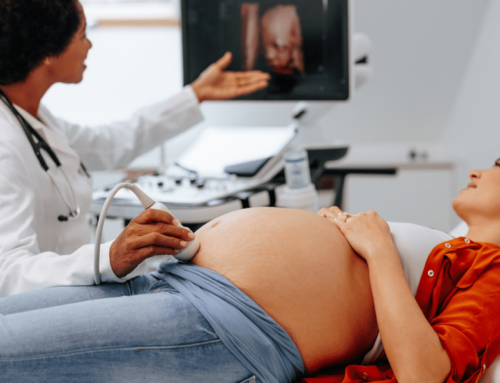Dizziness during pregnancy is very common. It happens due to higher levels of progesterone. This hormone increases your blood flow to your baby, which decreases your blood pressure, making you feel dizzy.
There are things you can do when you get dizzy while pregnant. Lying down is one of them, as well as not standing up too fast, switching to lukewarm baths instead of scorching hot ones.
While getting pregnancy dizziness is never pleasant, it usually happens between twelve weeks and the 3rd trimester, so it doesn’t necessarily last throughout the entire pregnancy.
Our best doctors at Trogolo Obstetrics and Gynecology in Jacksonville worked so that this article can cover everything related to being dizzy while pregnant, from symptoms, causes, and how to best deal with this.
Why Does Dizziness Occur During Pregnancy?
There are several causes why you might feel dizzy during pregnancy. One of the main reasons is that your body goes through a tremendous change. This includes changes to your cardiovascular system. It works overtime to try to compensate for both of you. This means that in the early stages of pregnancy, while your body is getting accustomed to its new status, it’s not producing enough blood, making you dizzy.
As mentioned before, high progesterone levels can also cause dizziness during pregnancy. The body tries to provide as much blood to your baby, which leaves you in a deficit. This causes your blood pressure to drop and makes you dizzy.
On another note, the lowest blood pressure one can experience is mid-pregnancy, which regulates itself towards the end.
While pregnant, a woman’s body produces more heat than it usually would. Because of this, spending time in overheated or stuffy rooms should be avoided. Make sure you get plenty of fresh air and sit in well-aired rooms.
Last but certainly not least, as the baby grows and your uterus expands, it can put pressure on your vessels and impact your circulation. Many want to know is dizziness a sign of pregnancy because many think it is. But no, dizziness isn’t a sign of pregnancy, not necessarily at least.
Is It Normal to Experience Dizziness in Early Pregnancy?

First, we have to tackle the difference between lightheadedness and dizziness.
They are not the same, even though people often think they are. Being lightheaded means that your head feels light, as the name implies, but your body feels heavy.
Dizziness makes you feel like the room is spinning as if you just got home from a party and drank too much. It comes as a feeling of spinning, being off-balance, and can be accompanied by blurry vision and headaches. It can also cause nausea. More often, it is known as vertigo pregnancy.
So, is this normal in early pregnancy? Yes, but it’s not as common.
Vertigo pregnancies are more common than lightheadedness, as they can start at 5-weeks. This usually happens due to hormonal changes and increased blood flow, which causes low blood pressure and low sugar levels in your body. However, dizziness can stay with you during your entire pregnancy. The culprit, later on, would be vena cava. This vein carries blood to your heart from the lower extremities. It can be pinched by the baby’s weight if you sleep or spend time on your back too much. Try and alternate your positions and not the static.
What Can I Do if I Experience a Dizzy Spell?
The first thing you should do is lie down either on your side or on your back and elevate your legs. This will increase the blood flow to your body and your brain. If you feel nauseous, try lying down on your left side, which helps subside nausea.
If you are not at home, make sure to sit down and, if possible, elevate your feet. Ask someone to bring you water with sugar, as this will help elevate your blood sugar and blood pressure, even though it’s not the tastiest of drinks. Another option would be to take deep breaths and breath slowly.
In case you have been experiencing dizzy spells for some time, try to avoid driving, working out, and going anywhere yourself.
Another essential thing to note is that fainting during pregnancy should be avoided at all costs, as this can harm both you and the baby. Even though fainting while pregnant isn’t as common as telenovelas would like us to think, it can still happen. So try and follow the steps we have laid out to avoid this.
Can I Prevent Feeling Dizzy During Pregnancy?

There is no guarantee of prevention, but you can minimize the risk of feeling dizzy while pregnant and even fainting during pregnancy if you follow our guidelines.
Firstly, try not to get up too fast. If you are sitting or lying down, try standing up slowly. You can also try and massage your legs to get the circulation going. Keep in mind that your body now pumps blood for two, which can often cause low blood pressure, instigating dizziness.
Eat frequently, not only to curb your cravings but also to ingest the necessary nutrients your body needs. Having multiple, well-balanced meals daily will keep your blood sugar up and keep you from overeating. While many do not recommend junk food and sweets, if you need them, you can have them. Just try not to go overboard.
Make sure you drink plenty of fluids. This can be water, lemonade (also rich in vitamin C), freshly squeezed juices, or smoothies. If you are active during your pregnancy, meaning you run or work out, try increasing your fluids intake as much as possible. As mentioned before, dehydration can cause dizziness or even fainting during pregnancy.
Avoid crowded and stuffy places if overheating causes your dizziness. Make sure you dress lightly or in layers that can quickly be removed and get plenty of fresh air. Don’t spend time in rooms with no airflow as they can also be full of dust and germs.
Don’t lie on your back, or try avoiding it as much as possible. As we explained before, in later pregnancy, this can cause your blood vessels to be compressed. In return, your blood circulation will be lowered and can cause dizziness.
If you exercise in any way, shape, or form, we recommend you try and take it easy. While working out can increase your circulation and is good for overall health, it is easy to experience hyperventilation. This, in return, can cause shortness of breath and lead to feeling dizzy or even fainting.
Final Thoughts
While we understand that being pregnant doesn’t mean you must be kept under a glass bell, we also know how difficult it can be for some women. Feeling dizzy while pregnant or fainting is never a pleasant experience; some women can be lucky enough to never go through this.
This is why we wanted to go over how you can help yourself when something like this happens and ensure you are safe.
As mentioned before, if you are feeling dizzy, it doesn’t mean you are pregnant. So if you have any doubts, we recommend you check with your doctor and do the necessary blood work. And you can always book an appointment at Trogolo Obstetrics and Gynecology so we can help you with everything you need regarding the dizziness you are experiencing.





